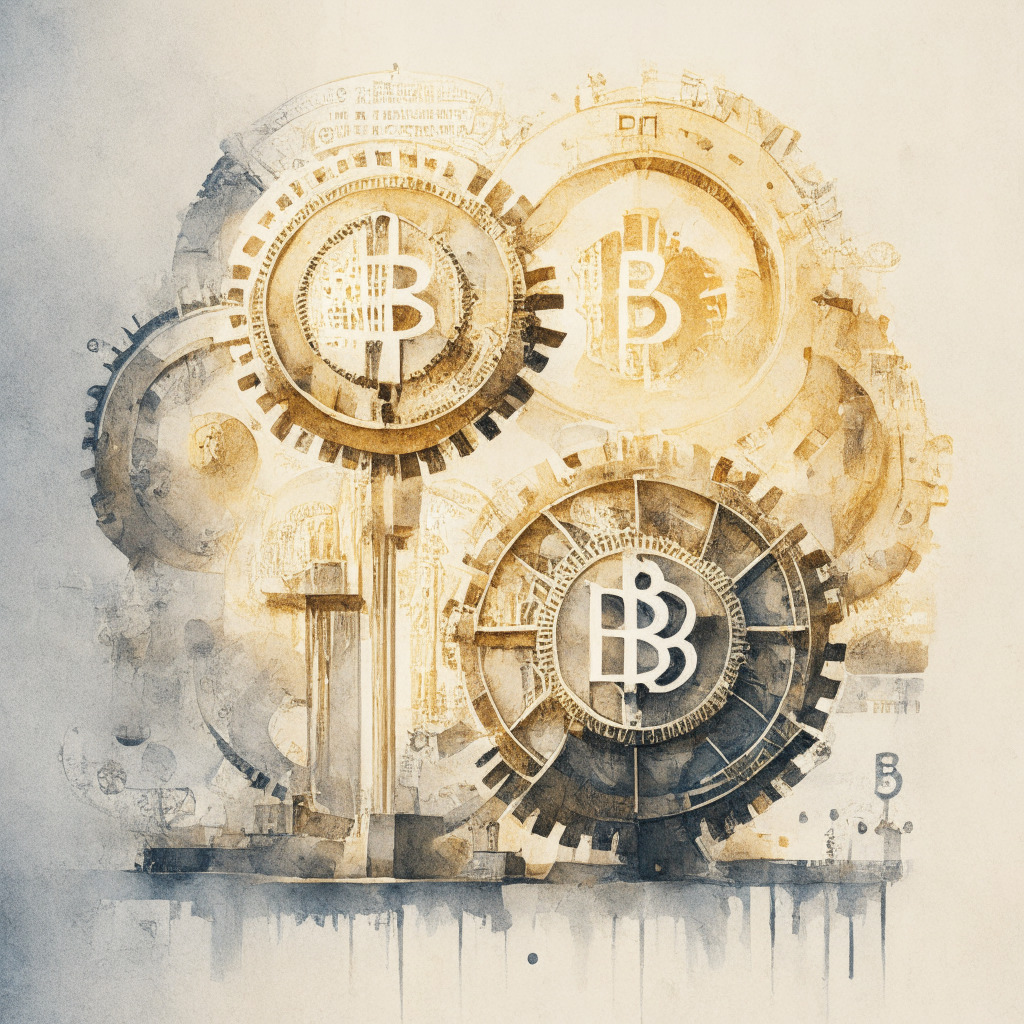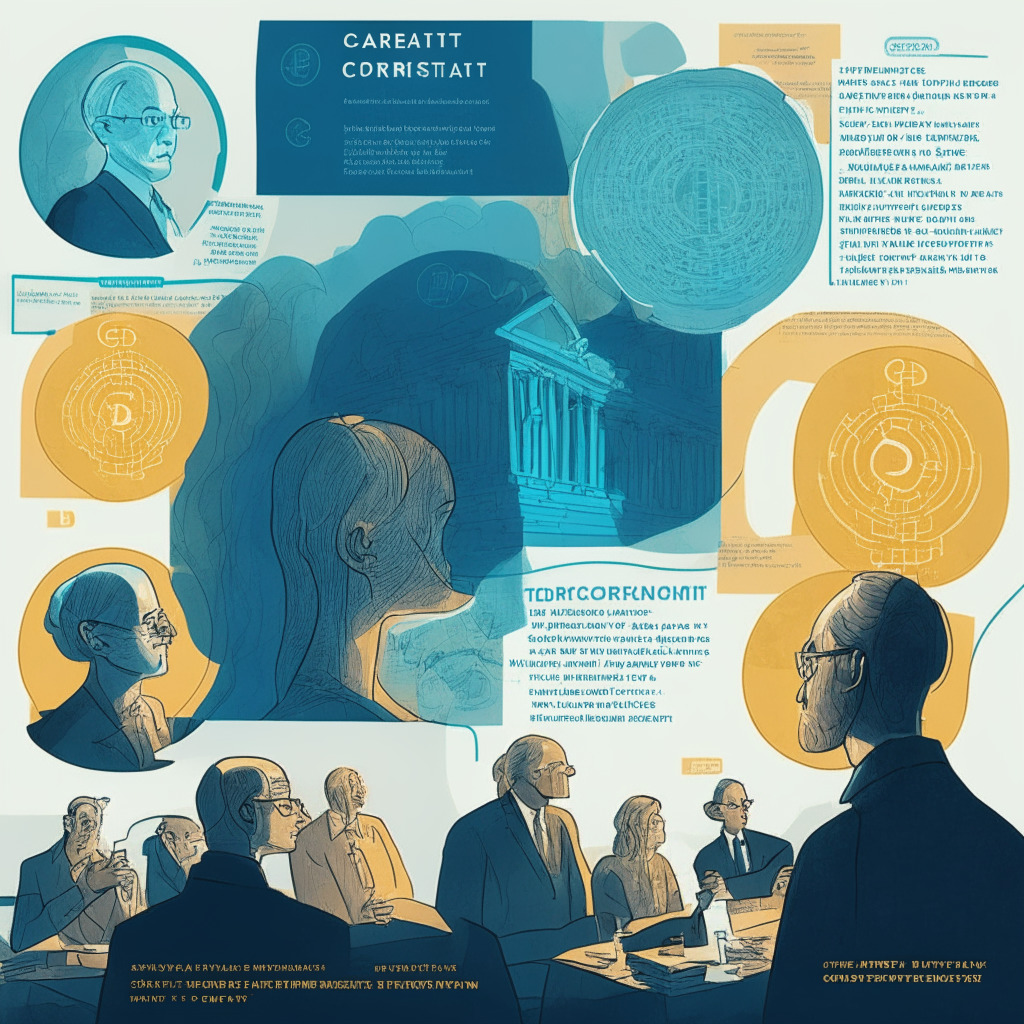The Federal Reserve Bank of New York’s NYIC and the Monetary Authority of Singapore’s Project Cedar x Ubin+ explored utilizing central bank digital currency (CBDC) for wholesale cross-border payments, focusing on interoperability and efficiency. Their findings showcase potential gains but also highlight concerns and challenges, including privacy, security, and financial system impact.
Search Results for: US Federal Reserve
Bipartisan Battle Against CBDCs: Financial Privacy vs Global Adoption in 2023
US lawmakers introduced a bipartisan bill aimed at preventing the Federal Reserve from issuing a central bank digital currency (CBDC), citing concerns over financial privacy and surveillance. Despite opposition, global interest in CBDCs remains strong, with various countries planning pilot testing in 2023.
Bitcoin Reacts to Fed Chair Powell’s Remarks: Understanding Crypto’s Sensitivity to Policy Shifts
Bitcoin’s price approached $27,000 as Federal Reserve Chair Jerome Powell delivered remarks on policy, impacting both traditional finance and crypto markets. The increasing interconnectedness of these worlds underscores the importance of understanding potential policy decision outcomes for both crypto enthusiasts and skeptics alike.
Fed’s Actions and Crypto Market: How Jerome Powell’s Remarks Impact BTC and Central Banks
Amid mixed crypto market expectations, US Fed Chairman Jerome Powell discussed the US banking system’s strength and resilience to support liquidity without compromising monetary policy. Investors must stay vigilant as decisions made by the Fed and central banks’ involvement in cryptocurrency could impact market sentiment and regulations.
Revolut’s License Woes & ASX Ditches Blockchain: Debating Innovation vs Stability
The Bank of England may reject Revolut’s banking license due to balance sheet concerns, while ASX Ltd opts for a conventional technology for its software overhaul instead of blockchain. HashKey Group plans to raise funds at a $1 billion valuation, and Grayscale exploits a potential loophole with a new Bitcoin ETF filing. Ledger’s controversial service launch is deemed a PR failure, and Bit Digital moves operations to Iceland for regulatory risk mitigation. Researchers suggest CBDC systems can be used for cross-border payments, and Switzerland’s canton of Zug raises the limit for tax payments in BTC and ETH.
Fed Chair Powell’s Speech Impact: Inflation, Rate Hikes, and Bitcoin Market Volatility
Federal Reserve Chairman Jerome Powell participates in the Perspectives on Monetary Policy panel on May 19, with Fed officials leaning towards raising interest rates to control inflation. Market participants, including the cryptocurrency community, closely watch the developments, especially Bitcoin prices, as the market remains volatile and uncertain.
Debt Ceiling Increase: How Bitcoin Could Face Losses Amid Rising Treasury Liquidity
Bitcoin could face losses in Q3 2023 due to the expected agreement on raising the U.S. debt ceiling, which might increase Treasury’s liquidity and impact risk asset markets, including cryptocurrencies. Bitcoin may struggle to reclaim yearly highs, with prices likely ranging between $20,000-$30,000 unless a new narrative or significant catalyst emerges.
Exploring CBDCs for Seamless Cross-Border Transactions: Potential and Challenges
The New York Federal Reserve and Monetary Authority of Singapore’s joint research suggests that Central Bank Digital Currencies (CBDC) operating on different networks could enable cross-border and cross-currency payments with near real-time settlement finality. This development highlights the potential for a transformative shift in global finance.
Unemployment Drops, Markets React: Crypto’s Growing Role in Economic Shifts
The recent decrease in weekly unemployment benefits and continuing claims has impacted U.S. stocks, with the Dow Jones Industrial Average falling and the cryptocurrency market experiencing a marginal decline. Stronger-than-expected jobless claims increase recession fears while the labor market remains highly competitive.
Crypto Market Unfazed by Debt Ceiling, Stablecoins Diversify, and SEC’s Ripple Case Unveils Secrets
As the U.S. debt ceiling discussions continue, stablecoin issuers like Tether and Circle diversify their reserves amid dollar risks. Meanwhile, a federal judge ruled the SEC cannot seal documents related to ex-official William Hinman’s 2018 crypto speech, potentially revealing the reasoning behind ether not being considered a security.
U.S. States Battle Over CBDCs: Privacy Fears, Rising Tension, and a Divided Future
Florida recently banned central bank digital currencies (CBDCs), sparking interest from states such as Louisiana, Alabama, Texas, and North Dakota who also drafted opposition bills. Privacy concerns, government control, and individual freedom are key factors contributing to the contentious debate on CBDCs in the US.
Tether’s 15% Bitcoin Investment: Pros, Cons, and Future of Stablecoin Regulation
Tether plans to invest 15% of its net profits in Bitcoin to strengthen and diversify its reserves, demonstrating the company’s confidence in the cryptocurrency market. As US lawmakers discuss potential stablecoin legislation, Tether’s bold move could potentially shape the future of the industry.
Litecoin’s Surge and Upcoming Halving: Can It Hit $1000 in 2023 or Is That Overly Optimistic?
Litecoin’s price has surged recently, fueled by technical buying and optimism for the upcoming halving event on 2nd August. Factors such as dovish Federal Reserve policy, increased interest in hard money alternatives, and Litecoin’s potential for everyday payments contribute to its positive outlook. Recent developments like LRC-20, Mastercard partnership, and the 2023 halving event bolster Litecoin’s prospects in the crypto bull market.
Crypto Shadow Banks: A Looming Crisis or Future Opportunity? Debating Regulation Pathways
Cryptocurrencies are disrupting the traditional financial sector, with “crypto shadow banks” like FTX, Celsius, and Voyager operating without regulation. As these banks become increasingly interconnected with the real economy, future runs could be potentially destructive. U.S. regulators face the critical decision of protecting these banks or the real economy.
Crypto Bank Runs: The Role of Whales and Risky Investments in Market Turmoil
A recent study found that the 2022 crypto bank runs were majorly triggered by whale account holders withdrawing large portions of their funds. Crypto platforms’ run risks arose from allowing unrestricted withdrawals while using funds for risky, illiquid investments, highlighting policy concerns.
Crypto Crisis 2022: High-Yield Risks, Massive Outflows, and the Need for Safeguards
The recent crypto crisis of 2022, triggered by the collapse of TerraUSD, followed by the downfall of Three Arrow Capital and FTX, exposed the dangers of relying on high-yield investments without proper safeguards. The crisis led to significant outflows of customer funds from major crypto lenders, while highlighting the need for enhanced security and risk mitigation in the crypto sphere.
Bitcoin’s Struggle: Bullish Rebound Possibilities Amid Regulatory Concerns and Market Shifts
Bitcoin recently broke past $27,200, but faces challenges as regulatory concerns and negative market sentiment persist. Despite billionaire Paul Tudor Jones expressing caution, he still believes in Bitcoin’s long-term potential. The critical support level to watch is $26,800.
Cryptocurrency Volatility: Exploring Top Contenders Amidst Bitcoin’s Uncertain Future
The cryptocurrency market experienced significant volatility recently, with Bitcoin cautiously moving towards $30,000. Crypto projects like AiDoge, Ecoterra, Conflux, and SUI gain attention with promising fundamentals and technical analysis. Investors must stay informed and research carefully before making investment decisions in these fluctuating markets.
CBDCs: A Solution in Search of a Problem or Financial Revolution? The Ongoing Debate
Minneapolis Federal Reserve Bank President Neel Kashkari expressed skepticism about central bank digital currencies (CBDCs), questioning the problems they solve and their advantages over existing systems. Despite his doubts, Kashkari remains open-minded as he awaits ongoing study results on CBDCs. This debate illustrates the lack of consensus on CBDC benefits and drawbacks in the ever-changing financial landscape.
Rising 10-Year Treasury Yield vs DeFi Yields: The Battle for Investor Confidence
The rising 10-year yield on US Treasury bills surpassed yields offered by DeFi protocols, impacting the competitive edge of DeFi investments. Some Ethereum-based liquid staking providers outperform US-backed bonds; however, crypto yields can be volatile, and risks like market fluctuations must be considered.
Bitcoin’s Battle: Reclaiming $27,600 Support or Facing Larger Bearish Breakdown?
Bitcoin is striving to maintain a bullish trend, operating within a crucial zone and attempting to establish support. A calm week of macro triggers implies reduced volatility from external sources, and the approaching difficulty adjustment may make a strong case for upside continuation.
Crypto Market: Navigating Risks Amid Rising Traditional Financial Metric Correlations
Bitcoin’s rally to $27,000 in 2023 shows buying exhaustion, struggling to move past $30,000, and increasing correlation with traditional financial metrics. The strengthening negative weekly correlation between Bitcoin and the rising U.S. dollar, cooled Fed rate cut expectations, and gold’s critical resistance level may signal a potential downtrend for Bitcoin in Q2, prompting investors to remain cautious.
Bank Deposits Decline: Crypto’s Surge or Inflation’s Crippling Effects?
US bank deposits are nearing $17 trillion, possibly signaling a shift towards cryptocurrencies like Bitcoin. Factors like bank failures, inflation concerns, and increased interest rates contribute to this decline, driving investors to explore alternative investment opportunities such as crypto. However, caution and thorough research are necessary before committing to cryptocurrency investments.
Bipartisan Rift Emerges on Stablecoin Bill: Consumer Protection vs State Regulation
House Democrats are considering a separate stablecoin bill, highlighting a rift with the parallel Republican effort. Addressing stablecoins is a key priority for US lawmakers overseeing crypto operations. The Democratic bill focuses on consumer protection, granting the Federal Reserve veto power over issuer registration, while the Republican version empowers states to regulate issuers.
Litecoin’s Future: Analyzing Bull Run Prospects, Market Concerns, and Payment Utility
Litecoin experienced a drop in value alongside broader cryptocurrency market pressures, though it has still grown by 20% since its mid-March lows. Despite short-term setbacks, macro conditions improve for cryptocurrencies, with the ongoing US bank crisis potentially providing a favorable climate for cryptos like Litecoin. Recent developments, such as Litecoin’s Mastercard partnership and the 2023 halving event, suggest a strong outlook for the crypto in the upcoming bull market.
Argentina’s Economic Crisis: Impact on Crypto, Traditional Assets, and Safe Havens
Argentina’s economic crisis, involving hyperinflation and peso devaluation, has led to discussions on the role of gold and cryptocurrencies like Bitcoin. Limited by costs and government control, fintechs in the country turn to stablecoins for remittances, while the financial turmoil may benefit risk-on assets such as Bitcoin.
Florida Bans CBDCs: Protecting Privacy or Hindering Technological Progress?
Florida Governor Ron DeSantis has officially banned Central Bank Digital Currencies (CBDCs) within the state, protecting residents from a potential Federal Reserve-issued digital currency. Critics argue CBDCs offer transparency and reduced costs but DeSantis claims they’re about “surveillance and control.” The decision’s broader implications on the crypto landscape remain uncertain.
Banking Crisis Fines: Will Traditional Finance Giants Embrace Crypto Amid Increased Scrutiny?
The U.S. SEC fined HSBC Securities ($15 million) and Scotia Capital ($7.5 million) for recordkeeping violations, as employees used unauthorized communication channels like text messages and WhatsApp. This ongoing tension between traditional finance and emerging digital assets raises questions about the future of cryptocurrency adoption.
Balancing Bank Regulations: Can Overregulation Hinder Progress and Create a False Security?
JPMorgan Chase CEO Jamie Dimon highlights potential troubles for U.S. banks due to overregulation and its obstructive impact on business practices. Emphasizing the need for a more holistic approach to regulations, Dimon suggests that solely relying on stress tests and overregulation may create a false sense of security and detract from addressing crucial vulnerabilities in the banking industry.
FedNow and Metal Blockchain Integration: Stablecoins, Privacy, and Financial Future Debated
The Federal Reserve’s upcoming integration with Metal Blockchain has sparked debates on stablecoins, privacy, and financial system plans. Metal Blockchain’s collaboration with instant payment service FedNow aims to enable rapid stablecoin conversions and potentially create interconnected “bank chains” for a secure, oracle-independent blockchain ecosystem.
Central Banks’ Veto Powers and Stablecoin Risks: Safeguarding Financial Stability in a MiCA Future
European Banking Authority Chair José Manuel Campa calls for central bank veto powers over large stablecoins, citing concerns for financial stability and public policy. The upcoming Markets in Crypto Assets (MiCA) regulation sets guidelines and requirements for stablecoin issuers, including stringent authorization and supervision processes.
Crypto Derivatives Boom: New Opportunities and Risks in a Centralized Landscape
The crypto derivatives market reached a new all-time high of 77.6% market share despite a 23.3% decrease in trading volume. This trend highlights the industry’s speculative nature and has raised concerns about centralization and potential manipulation in the sector.































